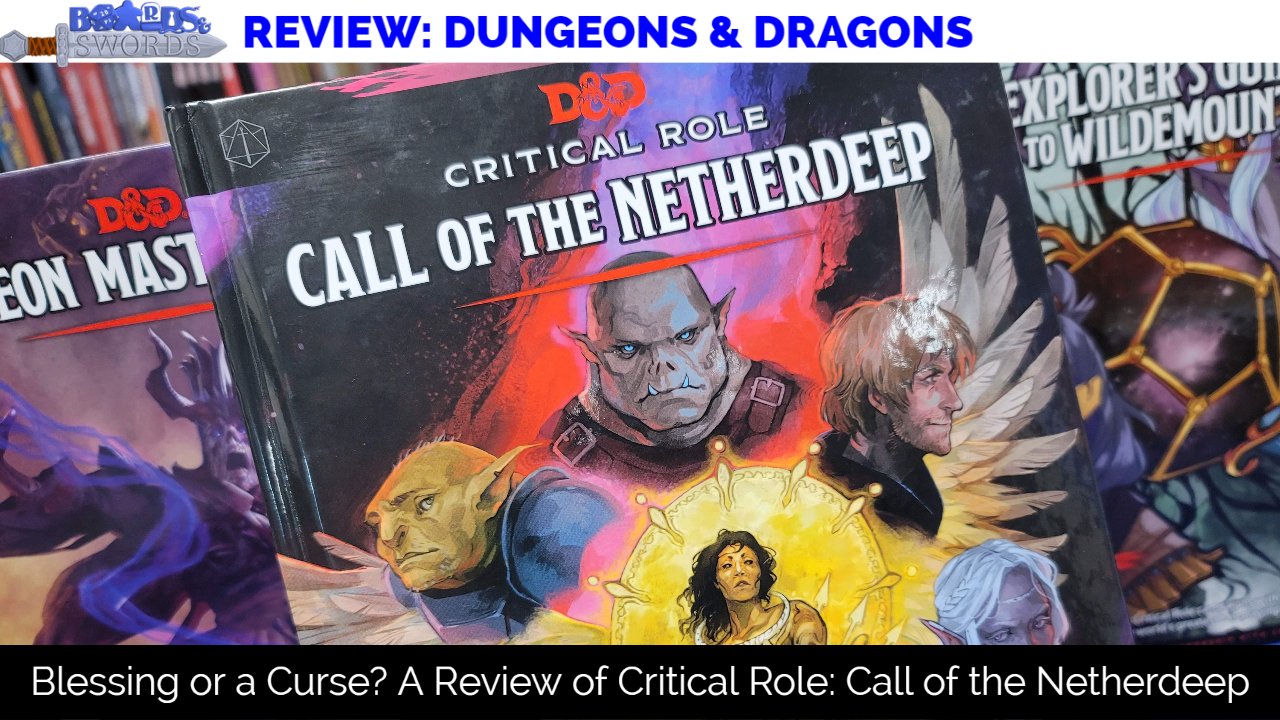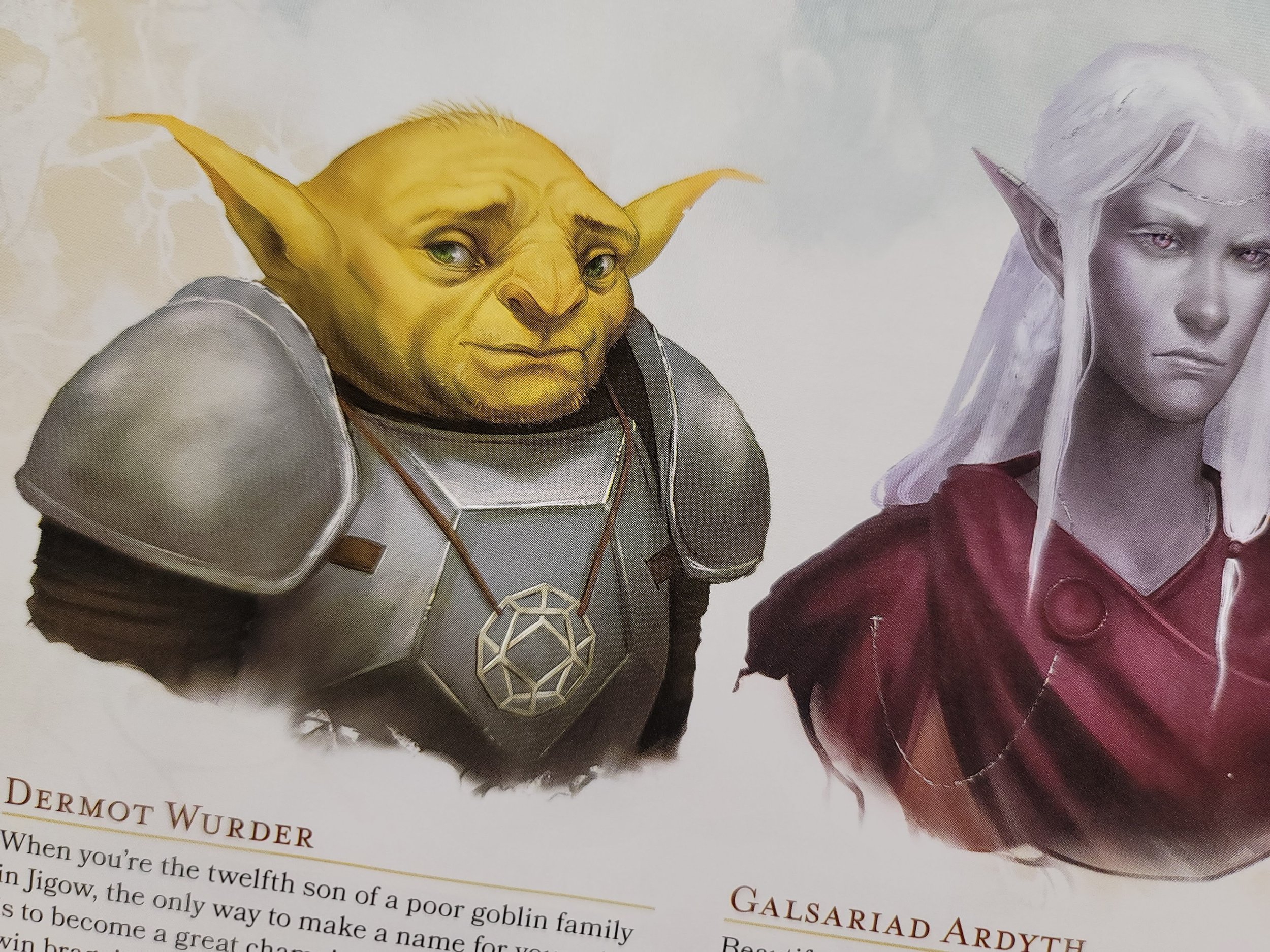Blessing or a Curse? A Review of Critical Role: Call of the Netherdeep (D&D5e)
I've mentioned before that I am not an avid Critical Role fan. There's nothing wrong with it, but it's the same reason I don't watch a lot of D&D Actual Plays: they are too long. I really don't have the time to watch 3-4 hours of gameplay every week. So with Wizards of the Coasts newest D&D adventure, Critical Role: Call of the Netherdeep, I knew I wasn't the intended audience.
A bit of TL:DR
I'm not really sure *who* the intended audience is. That's not true, I can take a guess that fans of Critical Role who have been playing D&D for a while will love this book. What I really mean is, I'm not really sure if the writers of the book knew who their audience is.
Critical Role has done a great thing for the RPG hobby. It's brought it into the limelight and exposed a lot of people to D&D that never have had the chance to play before. So many people have been able to get interested in D&D thanks to this show. However, it has also done a bad thing for the hobby: set people up for disappointment. Not every DM is Matt Mercer. He is an extremely gifted storyteller that has created an entire world worth of stories. In addition, his players have bought into that type of game, bringing just as much depth to their characters as Matt has done for the world.
The wide spectrum of DMs
If you've ever played D&D at a game store or a convention, you'll understand what I'm getting at - sometimes, it's a gamble what kind of DM and players you get. This isn't exactly a bad thing - every person has different styles of creativity, so you can get different styles of DM-ing. There's "theater of the mind" people, who can tell a story so that you can envision it in your head, but there's also people with elaborate displays that you can move custom minis through. These different styles help make D&D so special.
But, there's also the other aspect of the gamble of DMs: not every DM is a *good* DM. Being a good DM takes time and work, and most people will suck at it the first couple of times that they do it. The people that become the best DMs learn from these experiences and grow. The worst ones, never learn anything and stay stuck in their bad habits. They will typically have a group of players that enjoy their games, but anyone expecting "Critical Role" quality of gameplay will be sadly mistaken.
What does this have to do with the book?
Why am I spending so much time on this? The point of attaching the name "Critical Role" to this adventure is to give players and DMs an idea of what to expect. They know the world, the backstories, etc. I'm just afraid that the writers of the book also tried to make an adventure that gives you that same feel as the web series. Which is a neat idea in concept, but when you consider the spectrum of DMs I mentioned above, is a little harder to execute.
Getting into the nature of the book, this adventure has players stumble into a vision of someone needing their help. Then, they go through different encounters to discover who this person is, why they are in need of help, and how they can intervene. Good idea so far, but there's a catch: there is a rival adventuring party who has also heard this call. Their story is interwoven with the player's party as the two groups try and figure out what is going on.
Ok and…?
I understand why this idea was used: it provides a depth to the story that helps bring the feel of the Critical Role series. Bringing to life NPCs that the players regularly interact with means that the story dynamically changes as the players can see how their actions are affecting those around them. Over the course of the story, these rivals can become friends or enemies, and the book details how to treat each section of the adventure with the status the players have with said rivals. Which means, this is A LOT for the DM. Remember, most of the people who love Critical Role have never played D&D before 5th edition. This concept is a pretty high-level concept for a fan base that consists of a lot of beginning level DMs.
Let me be more blunt: I've been playing D&D off and on since 2004. I've definitely been a player far more than a DM, but I've still DM-ed *a lot* of different adventures over the course of those 18 years. Some pre-written, some I created myself. I do not think I could run this adventure. This would be pushing my skills a lot. I'm sure I could figure it out, but I get a little stressed thinking about keeping track of 5 regular NPCs and making sure I remember all their backstories and goals and drives. Keeping note of how each of the players interact with the NPCs and adjusting those NPCs "reputation" with the party? Buh.
If I am going to have this much trouble running this adventure, what hope does this have for someone that's only been a DM for a little bit? What if someone is using this as their FIRST chance at the DM chair? That's what scares me the most - someone who has wanted to try out DM-ing, is a fan of Critical Role so they think an adventure set in that universe will make things easier. They already know a lot of lore and characters, so makes things familiar to them. I just feel like Matt Mercer needs to write an official "How to be a DM" guide for Wizards of the Coast that people need to read before reading this book. There needs to be a way to bring people from "Level 1" DM to being able to run this type of adventure.
A Drowning Pool
Let me actually draw an example from the book instead of just yelling at the void. The first part of the adventure ends with the players racing their rivals through an underwater course. It's a really neat concept, as it provides all the intricacies of a dungeon without it being full of combat. It's also something really common in D&D: a skill challenge. Each room provides a different obstacle to get around, and players have to roll their skills/saving throws to get past them. As they succeed, they pull ahead of their rivals. As they fail, the rivals gain the upper ground.
The great thing about the adventure is that it doesn't expect the players to win. In fact, it has circumstances built in through the rest of the book on how this affects the relationships with the rivals depending on who won the scenario. So the DM doesn't need to try and make it challenging but yet suddenly have the players win in the end in order to proceed. The *real* problem with this encounter is that it can be a boring affair unless you know what you are doing. When you boil it down, the encounter is just a series of dice rolls to determine who wins. The players don't even have a lot of agency in what specific dice rolls - the book tells them the type of challenge and what the DC is to overcome it.
Remember, this is Chapter 1 - so not much build up if you are trying this game as your first time in the DM chair. The best DMs have already figured out ways to get around this. You can put a lot more exposition and description into the scenario so it doesn't seem so cut and try. Or, instead of having everyone roll the challenges, you could highlight specific players and let them shine at what they are best at, and just assume that the rest follow. The most experienced DMs probably know that their players will try and throw curveballs at them and devise new ideas that the adventure hasn't thought of. Those DMs will just throw out the adventure as written and come up with solutions on the fly to keep things interesting and get players to the end goal.
A great idea, but…
Yet, the book doesn't tell you any of these strategies. It just presents the adventure and assumes that the DM has the ability to keep things interesting. And while I haven't gone into any more specifics, this is the crux of my review: the book provides a lot of challenging and unique encounters but doesn't provide enough behind the scenes help for the DM. It gives you in-world help with lore and background and story reasons for specific beats to happen, but none of the mechanical help that a DM needs on how to execute those scenarios in a way that is fun for people.
If you love Critical Role, I'm sure you'll love this book. In fact, you've probably already bought it already. If not, you can get it here. If you are a DM that wants to "up their game", I highly suggest this book. If you can run it properly, you might find yourself a much better DM on the other side of the adventure than when you started. If you are a first time DM, I would probably suggest trying some other adventures first. Or at least, getting a bunch of resources and help from other DMs on how to best run the adventure without boring your players. Heck, feel free to message me and I'll try and offer whatever help I can give.
Note: I generally assume I know nothing. So if I've missed something, let me know in the comments. Or let me know on Twitter or Facebook. If you like these types of posts, consider subscribing to our patreon.





